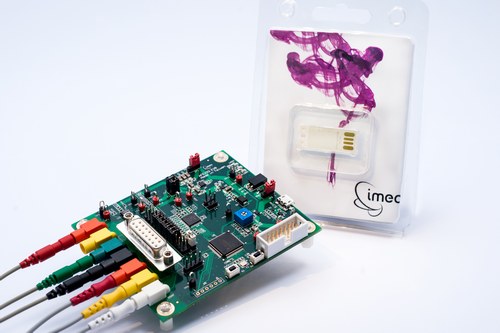Imec, Holst Centre and the East-Limburg Hospital (Ziekenhuis Oost-Limburg, ZOL) have announced a strategic partnership to accelerate the development of wearable sensor technologies for remote healthcare and personal health applications. The agreement unites Holst Centre and imec’s technology expertise with ZOL’s clinical excellence to focus the development of remote monitoring where it is most relevant to the healthcare domain, and enable rapid validation of new technologies and applications.

Real-time, wearable remote healthcare monitoring could revolutionize the treatment of chronic illnesses such as heart disease and diabetes. Diagnosed patients wouldn’t need to visit the hospital as often or for as long, while healthy people in high risk groups could benefit from an unobtrusive system that provides early warning of a condition developing.
The partnership between Holst Centre, imec and ZOL aims to speed up the development of such systems. Clinicians from ZOL and the Mobile Health Unit (a joint initiative between ZOL and Hasselt University) will test Holst Centre and imec’s wearable remote monitoring technologies on real patients in real clinical settings. In this way, the partners aim to answer questions such as “How comfortable are the devices to wear?” and “Can they detect conditions like heart arrhythmias?”.
In addition, the partners will share clinical and technical insights to identify ways in which wearable remote monitoring technology can better address unmet healthcare needs. This will lead to improvements to existing solutions and the development of new applications. The long-term nature of the partnership will also allow a more exploratory aspect to the joint research, to address clinical needs that may emerge in the future.
The partnership is already seeing results. At November’s Wireless Health 2013, the partners presented a small pilot study on the use of wearable sensors to detect sleep apnea.
Meanwhile, imec and Holst Centre have announced evaluation kits (pictured) for their ultra low power ECG analogue front end chip for ambulatory cardiac monitoring.
The ultralow power ECG analog front-end chip provides ECG monitoring at extremely low energy consumption (20uW per channel at a supply voltage of 1.2V). The chip monitors up to 3-lead ECG signals in compliance with ANSI-AAMI and IEC standards for ECG monitoring. The chip also monitors tissue-contact impedance to provide real-time information on the electrode contact quality and lead-off detection.
The evaluation kit provides all necessary hardware and software to evaluate the characteristics of the chip, and includes the above ECG front-end chip and an evaluation board to measure the performance of the chip. The kit is fast and easy to set-up, and can be easily customized to meet the specific solution of the customer.
